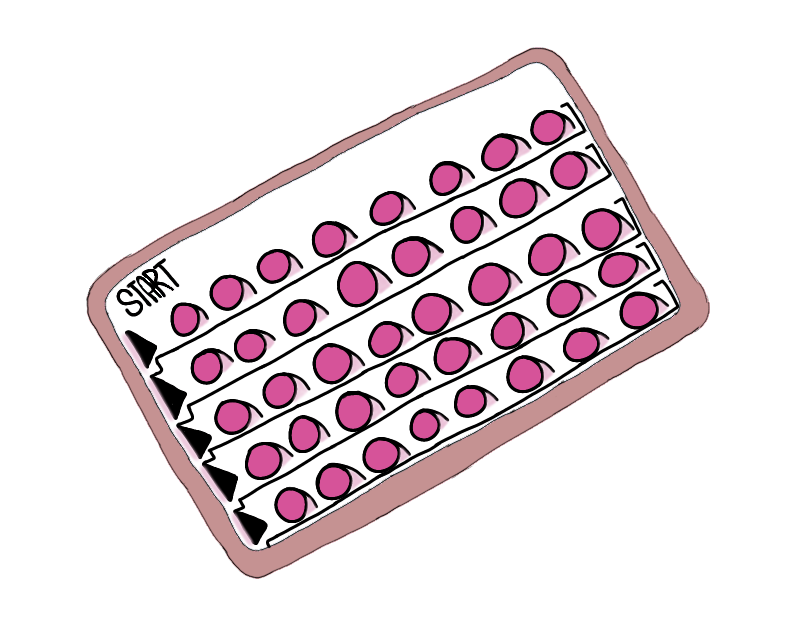Are You Really in Control When on Birth Control?
The lesser-known side effects of using birth control.
Graphic Illustration of a full pink birth control pill packet
Birth control can be a very helpful resource to menstruating people of various ages, for many reasons. In the past, birth control was mainly used as a contraceptive, but now it is prescribed more frequently and used to treat a slew of issues, but many people don’t know as much about it as they think.
There are many different forms of birth control accessible for teens. In the United States, the oral contraceptive pill is the most commonly used form of birth control. Some other common devices are available, such as the intrauterine device (IUD), birth control shot and the Nexplanon implant.
With all of these options available, deciding which form is best for your own personal needs may be difficult. Senior Nadia Wohlfarth attends Broadneck High School in Maryland. She has tried multiple birth control pills and has experienced the negative effects of them. She explains her choice of using the pill, instead of the alternative options she is familiar with, “It scares me that I could react negatively to the shot and it would take months for the side effects to go away. I also wouldn’t use an IUD because they are painful and I need hormones to manage my day to day headaches.”
People can go on birth control for a variety of reasons. It seems that many people’s first thought for why someone may go on birth control would be for preventing pregnancy. However, using birth control to help with extreme menstrual symptoms, regulating periods and several other reasons is becoming more common. Wohlfarth shares her reasoning, “I have had horrible periods since they started, and birth control was the only option for me to find relief. Between extreme cramps painkillers didn’t help, mood issues, migraines, and fatigue, my periods were unmanageable.”
While birth control is becoming more common for teens, it may be difficult for some to convince a parent to allow them to start it. Others may have the opposite experience, depending on their reasoning or their parents’ knowledge on the subject. “My parents were supportive of birth control, especially since my primary motivation was for health reasons,” Wohlfarth explains.
If you were to decide to go on birth control, there is never a guarantee that the first method you try will work out for you. Personally, my doctors explained it to me like this tiny pink pill was going to magically change my life forever and my period would suddenly disappear. With the first two brands I tried I had terrible side effects, causing me to stop using birth control altogether.
This is a universal experience for many. After talking with Wohlfarth, she told me about her experiences with different pills, “My current pill is the third one I have tried. The first one gave me flu-like symptoms and I took it for less than a week. The second felt alright until the off week, and then it gave me the worst migraines of my life. It was nonstop pain for a week that left me paralyzed, not even able to make facial expressions.”
This doesn’t mean that there aren’t any options out there for some people. As stated earlier, there are so many different forms of birth control available. For birth control pills alone there are over 50 different brands to try and choose from. However, in a documentary called “The Business of Birth Control,” they showed how many of the different brands presented are actually duplicates under the same name, which could be cause for repetitive side effects on “different” pills.
After experiencing extreme side effects, many people find out they are due to the type of hormones produced by the pill. The birth control pill comes in a few forms, including an estrogen-only pill, progestin-only pill and a combination pill, that contains both hormones.
Wohlfarth shares her situation with different types of hormone pills she’s used, “We found out my reaction was due to using a pill containing estrogen, which typically is dangerous for people with migraines. It significantly raises the chance of stroke and blood clots even if you don’t get unbearable migraine pain on it.”
It is relieving that there are options available for almost anyone needing to take birth control, and most side effects are short-term. For those taking birth control to prevent pregnancy or other temporary reasons, birth control is proven to be almost completely safe. However, those who are prescribed birth control for life to manage conditions like endometriosis or heavy and painful periods, may be more at risk to some of the long-term side effects of hormonal birth control. What they don’t tell you about birth control is the poster board sized sheet of side effects included with the pills. It was also never explained to me the long-term risks. As a 16-year-old who would probably have to take this for the next 30-40 years, it would have been nice to be informed of my increased risk of certain cancers.
There is mixed evidence proving whether or not birth control can cause some reproductive cancers. There is evidence to support that taking birth control for long-term use can actually increase your risk of breast and cervical cancers. However, other studies show that long-term use of birth control has actually shown to reduce the risk of certain endometrial and ovarian cancers. It has been proven that both progestin and estrogen pills increase people’s risk of developing blood clots.
The podcast “iWeigh” has an episode called “What You Should Know About The Birth Control Pill.” In this episode, Jameela Jamil speaks with multiple women and talks to them about their experiences and the misinformation people are given about birth control. The most interesting thing I found in this podcast was when they talked about how the use of hormones can actually alter your brain chemistry. The use of hormonal birth control stops ovulation. Part of someone’s attraction towards others is influenced during ovulation. In this podcast, women shared how the person they were dating while on birth control was suddenly unattractive to them once they stopped taking it. I found that very interesting and felt that it was definitely a lesser-known side effect.
The reason so many people taking birth control don’t know about the effects it can have may be due to the lack of education. When I took health class, we learned about two forms of birth control, the contraceptive pill and the IUD. We were only taught about how it was used to prevent pregnancy and were never told about all the other uses it had.
Birth control overall can be incredibly helpful to some people, but there is not enough information about the effects it has on those taking it. It is important for those planning on taking birth control to make sure they’ve done full research on the side effects and know what they could potentially be putting themselves at risk for.
Your donation will support the student journalists of Troy High School - MI. Your contribution will allow us to print our work, purchase equipment and cover our annual website hosting costs.



